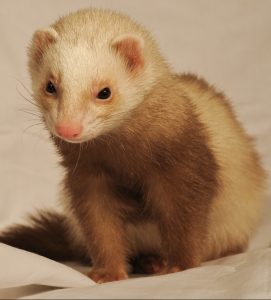Ferrets are pretty interesting animals.
First, while they are native to Europe (with only one species, the Black-footed ferret, being native to North America) they were domesticated hundreds of years ago by humans.
Now, they are the lovable and playful companions we see today.
They originate from European polecat, which is in the same genus as weasels.
While most of the wild is gone from your ferret’s bloodline, they still have the same biology as their wild ancestors.
This means that their instincts still work, and they still require a lot of the things they did before domestication, including food. The best thing you can do for your ferret is cater to these natural needs.
Take a dog, for example. Dogs were domesticated hundreds, if not thousands, of years ago, and the dogs we see today are quite different from their wolfish ancestors.
However, it’s easy to see that many of those primitive natural instincts are still ingrained in them.
That’s why we buy them chew toys and bones in order to appease their instincts and help them live a happier life.
Your ferret is no different. By learning about how they behave in the wild and learning about what they eat in the wild, you can help your ferret live a healthier, happier life.
What Do Ferrets Eat In The Wild?
Ferrets are obligate carnivores. This means that they’re just a little bit different than your average meat eating animal.
You see, ferrets don’t just rely on meat as a food source, it’s an absolute necessity to their everyday life and functioning.
Their digestive tracts have been altered to the point that, while they can digest fruits and vegetables on occasion, their body simply doesn’t have the metabolic ability to truly derive nutritional value from them.
There is no such thing as a vegan or vegetarian ferret. They have to have meat to survive.
In the wild, ferrets roam anywhere from 100 to 120 acres everyday while they hunt.
They are nocturnal, and, after sleeping throughout the day, they spend their nights relying on their keen senses to hunt down their prey using their sharp teeth.
 While ferrets themselves enjoy being in groups and will communicate with each other using chirps and a variety of different sounds, their ancestors, the polecats, were solitary animals and hunted by themselves a majority of the time.
While ferrets themselves enjoy being in groups and will communicate with each other using chirps and a variety of different sounds, their ancestors, the polecats, were solitary animals and hunted by themselves a majority of the time.
Ferrets consume up to 70 grams of meat each day, and they will eat every part of their prey, including the bones.
The bones, while also a source of nutrition, help ferrets keep their jaws and teeths healthy, strong, and, in the case of their teeth, clean.
Here is a list of what animals ferrets consume in the wild:
Rodents
Rodents and small mammals make up a large majority of the ferret’s diet in the wild. They can be found eating mice, rats, and prairie dogs.
Fish
Fish are a rarer part of their diet – which means that, in captivity, it should only be given as the occasional treat rather than a nutritional meal.
Stick to freshwater, white fish, which would resemble those in the ferret’s natural habitats the most.
Birds
Pigeons, doves, and other game birds make up this section of your ferret’s natural diet. They will also eat the eggs of birds.
Amphibians
While ferrets aren’t aquatic like their other family members, the minks, they do try to stick towards bodies of water.
This means that they can often be found eating amphibians such as frogs.
Reptiles
That’s right. In the wild, you can even find ferrets eating reptiles such as snakes.
What Should you Feed Your Ferret?
So what does all this mean? Well, as seen from the lists above, a ferret’s diet consists of solely meat.
That means that diets full of carbohydrates and fats aren’t good for them and won’t offer the right nutrients.
Due to their short digestive tracts and high metabolisms, you’ll need to feed them 8 to 10 times a day.
Raw meat is preferrable. This is what mimics their natural diets best. However, if that’s not an option at every meal time, then substituting dry food is alright. There are a few things to make sure of, though.
The main and most important thing to remember is what ingredients are used.
When you take a peek at the ingredients, it’s important to make sure that the first ingredient is meat.
Most cheap foods have a grain by-product as the main ingredient, with some sort of meat by product further down the list.
To help you out, here are some of the best 5 foods to supplement into your ferret’s diet.
Top 5 Ferret Foods Most Similar to Their Natural Diets
1) Wysong Epigen 90 Digestive Support Dry Ferret Food
The Wysong Epigen 90 Digestive Support ferret food is designed specifically for ferrets.
It features an abundance of protein in the form of chicken meal, organic chicken, and chicken fat, which are the first free ingredients listed.
In fact, it has a minimum of 62 percent protein, mimicking your ferret’s natural diet.
Wysong also goes one step further than being grain-free by using a patented process that completely removes all grain and starch from their food, making it perfect for your ferret’s sensitive stomach.
It also features probiotics, antioxidants, vitamins, minerals, and fatty acids that will help produce a fully balanced diet for your ferret without sacrificing any of the protein that they need.
The pellets are designed so that they are safe for all ferrets, whether they’re a baby, adult, or senior.
It’s important that you transition over to this food, which can be used as a meal or a protein boost, slowly, especially if you’re switching from a food that your ferret has eaten for a long time or one that is low protein.
2) Marshall Pet Products Premium Ferret Diet
Low in price, high in protein, this ferret food is great when you’re trying to provide the proper diet for your ferret on a budget.
You can feed this food to ferrets of any age. The first three ingredients are chicken by products – which only includes chicken organs, and chicken by products meal.
It also contains a variety of important vitamins and minerals such as Vitamin A and Vitamin E.
For senior ferrets who may struggle to chew the hard pellets, one customer states that they mix the pellets with water to achieve a smoother, softer texture that their ferret loves and is able to eat without any discomfort or difficulty.
However, one thing to note is that the Marshall Pet Products Premium food is not grain or starch free.
If you are going to use this food, it is especially important that you base your ferret’s diet mainly around raw meat.
This food is best to mix it with other food either as a transition or to make it last longer.
3) ZuPreem Premium Daily Ferret Diet Food
While this is on the pricer end of ferret food – in fact, you could almost consider this a luxury item – it is made with a variety of highly coveted ingredients that your ferret will love.
The main ingredients are chicken (including meal and fat) and dried egg product, which is extremely close to what they would eat in the wild.
It also has a variety of other necessary vitamins and nutrients, including: Vitamin C, Vitamin A, Vitamin D, Vitamin B12, Zinc, and Biotin.
There are different shopping options for this product as well. You can either buy an 8 pound bag, a 4 pound bag, a pack of two 4 pound bags, or a pack of three 4 pound bags, allowing you to customize your order and shipment to your needs.
With this food, it is still highly recommended that you mix in raw meat to fully meet their dietary needs.
4) Marshall Premium Ferret Diet
Available in a 4 pound, 7 pound, or 35 pound bag, the Marshall Premium ferret diet offers you the ordering and shipping customization and variety you need to best meet your and your ferret’s needs.
This food, which is rich in Omega 3 and Omega 6 fatty acids, is designed to meet the dietary needs of all ferret age groups.
This food bag also contains much needed vitamins and minerals such as Vitamin A and Vitamin E.
Yet, this food is better as a transition food or filler, however, so make sure to still include raw meat to fulfil your ferret’s dietary needs.
5) Wysong Ferret Archetype
Wysong is an extremely popular brand due to their patented technology that allows them to create food that is not only packed full of protein but that is also grain and starch free.
The first three ingredients are Chicken, Chicken Organs, and Ground Chicken Bone. This is rich in vitamins, minerals, and fatty acids that help provide the absolute best diet for your ferret.
There is something a bit interesting about this food, however. It does have a high concentration of fruits and vegetables.
This means that, while it can be used alone as either a transitional or filler food, it is not recommended as the only part of your ferret’s diet.
Instead, this was designed to be an adjunct to the aforementioned Wysong Epigen 90 Digestive Support ferret food in order to help meet all your ferret’s dietary needs.
What Should you Avoid Feeding Your Ferret?
Now since you know what to feed your ferret, here are some of the things you need to avoid.
Dairy
Ferrets are pretty much tiny lactose intolerant humans. While they may love everything dairy – ice cream, milk, etc – they simply can’t have it.
Remember how we were talking early about how their digestive system wasn’t designed with the proper enzymes to fully digest fruits and vegetables? Same thing here.
Ferrets don’t have the enzyme to digest lactose, so giving them dairy can cause an upset tummy.
Dog or Cat Food
While cats are often considered obligate carnivores like ferrets, neither cats nor dogs have dry food that is suitable for ferrets.
Their food is often high fiber and high grain, which is difficult for ferrets to digest. It also fails to offer the proper amount of different nutrients for your ferrets.
High Fiber Grains
This is another one of those many foods that, due to their natural biology, ferrets struggle to digest. Avoid feeding them foods such as breads or cakes.
Grapes
Like with cats and dogs, grapes can cause kidney failure in ferrets.
Final Thoughts: What Do Ferrets Eat In The Wild?
 Making sure that your ferret has the absolute best food possible is a necessity to their health. They have a very particular and strict diet that, if strayed from, can cause them to become sickly.
Making sure that your ferret has the absolute best food possible is a necessity to their health. They have a very particular and strict diet that, if strayed from, can cause them to become sickly.
As obligate carnivores with a specialized, short digestive tract that isn’t designed for processing and digesting foods like dairy, fruits, and vegetables, it’s important that, while a little off-putting at first, you try to include as much raw meat as possible.
When you’re not feeding your ferret raw meat, you need to do thorough research and find a packaged food that contains mostly meat ingredients with little to know fillers, especially those that are grain based or are artificial.
While there are a few bagged food options, such as Wysong Epigen 90 Digestive Support ferret food, that can completely meet your ferret’s need for protein, most foods are best used as either a transitional or filler food .
These foods are useful for the occasional supplement if you are unable to feed them raw meat at every meal time, which can be up to ten times a day depending on different factors such as your ferrets personality and age.
Whie adapting to your ferret’s dietary needs may take some getting used to, you’ll find that taking the time to make sure that your ferret is as healthy and happy as possible is well worth it.
Your ferrets will apprecipate it, especially when they’re running around and playing to show off their happiness.





